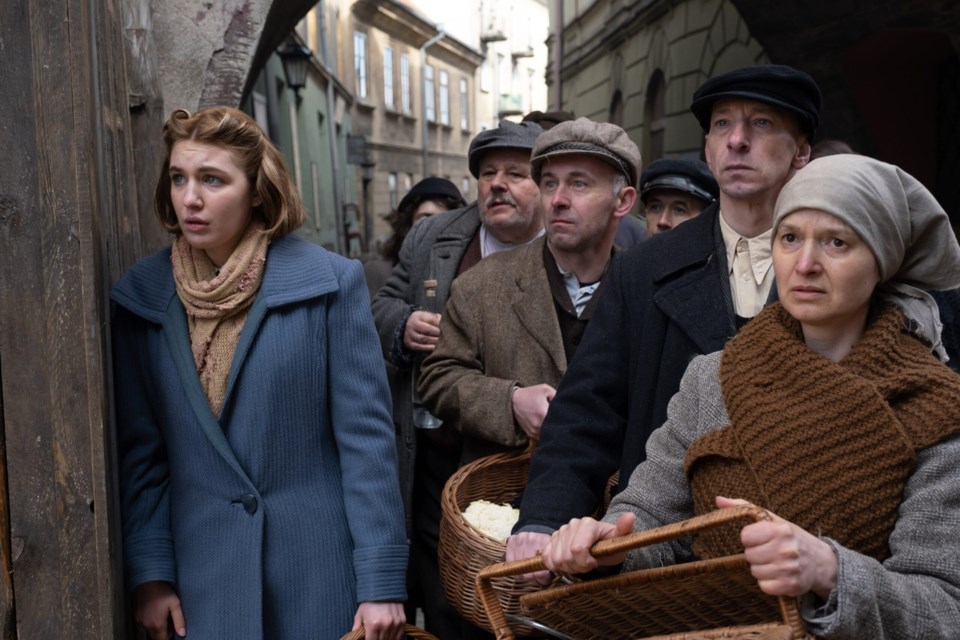As Sophie Nélisse filmed her Holocaust drama "Irena's Vow" in Poland, she was acutely aware of the present-day horrors unfolding in neighbouring Ukraine.
The movie, which opens Friday across sa���ʴ�ý, tells the true story of a young nurse who risked her life to shelter a dozen Jewish people during the Second World War. It was shot in the Polish cities of Warsaw and Lublin in 2022 as Ukrainian refugees were fleeing into the country during the Russian invasion.
“Being next to Ukraine, we felt the ramifications of the war with soldiers and refugees being in our hotel. It was so hard to just be surrounded by that every day and it was hard to detach from a reality that's just so close to ours,” says the Montreal-based actor in a video interview.
“It was like a constant reminder of how important it was to do this movie. Genocides like that keep happening and stories like these need to be told.”
Nélisse plays 19-year-old Polish Catholic nurse Irena Gut, who is forced to work in support of the German war effort when the Nazis occupy Poland. She’s assigned to be the housekeeper of Nazi commandant Eduard Rügemer, played by Dougray Scott, when she overhears plans to “liquidate” all the Jews in her town. Gut hatches a plan to hide 12 Jewish workers in the basement of the commandant’s house.
“Irena’s Vow,” a Canadian-Polish production, was directed by Montreal’s Louise Archambault and written by Dan Gordon, who also wrote the 2009 Broadway play of the same name.
“When I heard that it was a true story, I was just shocked. I thought some of the events had been embellished for the perks of storytelling,” says Nélisse, best known for playing teen Shauna Shipman in hit survival drama series “Yellowjackets.”
“And then when I heard that everything is true and that she really led that life and accomplished all these things, I thought it was a story that's still so relevant to this day and felt the need to spread her life's work.”
Nélisse’s research ranged from studying interviews Gut gave over the years to working with a dialect coach on her Polish accent.
“What really struck me was how bright and warm she still appeared to be, despite everything that she’d been through. It was really important for me to showcase that in my performance,” she says.
Gut eventually immigrated to the United States, where she became a public speaker and author, drawing on her experiences during the Holocaust. She died in 2003.
Nélisse says the tragic nature of the film and the stark reality of the Russia-Ukraine conflict just a couple of hundred kilometres away took an emotional toll on her.
“I definitely carried it with me (after filming scenes),” she says.
“My mom was with me on the shoot, and we would try to just get our minds off of things. On weekends, I'd try to do anything but talk about work. We would just go visit some lakes, go to the outskirts and do a lot of walking out in nature, which felt grounding.”
But Nélisse grasped the weight of the film's message. She says if "Irena's Vow" can make “a tiny bit of difference” in the world, then she's done her job.
“You'd think that such traumatic events would be left behind and not repeated, but unfortunately, they aren't. They still keep happening every day around us, and it feels so far away but it's not really,” she says.
“I think part of the reason why wars like that keep happening is because we're so self-centred and so quick to judge other people by their differences, whether it's political values or religion. As cliche as it is, I think we are beautiful as a society because of those differences.
"If, like Irena, we were more empathetic and more open-minded, there would be a lot less conflict in the world.”
This report by The Canadian Press was first published April 17, 2024.
Alex Nino Gheciu, The Canadian Press



